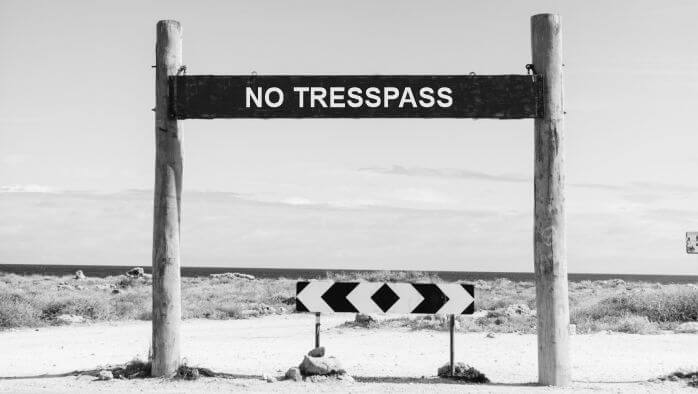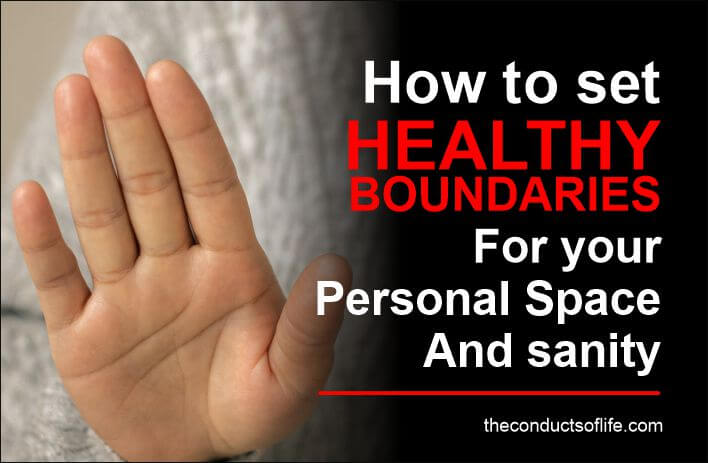Setting boundaries is one thing and knowing how to set flexible or healthy boundaries for your space is one of the best things you can do for yourself for sound mental health and your sanity.
Research has it that people who know how to set non-toxic boundaries develop into confident persons having unique skills and interests.
Many live their lives for the sake of living and do not have control over what comes their way.
With healthy boundaries, you can choose who gets closer to you, how they affect you, and how to respond.
In this article, we will dwell solely on establishing healthy boundaries and their importance.
Here is an article about the basic meaning and types of boundaries. This article is strictly on healthy boundaries.
Here is another article on setting boundaries with your partner in a relationship.
To see all articles bordering on personal boundaries check this boundary category on this website.
What is a healthy boundary?

Healthy boundaries also called flexible boundaries are the moderate hedges you put around you to protect your physical and emotional well-being in your relationships and social conduct.
Flexible boundaries are healthy enough to be in between toxic or rigid boundaries and porous boundaries.
Knowing how to set these restrictions should be the responsibility of everyone who understands the importance of safe personal spaces.
It is a key determinant of your physical and mental health. While boundaries differ from person to person and can change over time according to preference, they involve communicating them so others understand them fully.
Related: Physical Boundaries And It’s Importance
Healthy boundaries can come in the form of having few friends, staying anonymous on social media, dressing in a certain way, or any behaviour that keeps you fulfilled.
Creating such hedges is striking a balance between rigid and poor boundaries.
Some people think of healthy boundaries only in relationships. While it is essential in relationships, it is needed as well in every important area of a person’s life.
Related: The Good and Bad of Rigid Boundaries
Importance of setting healthy boundaries
When a healthy restriction is established properly, it has the following benefits:
- It filters out unruly influences and makes you fully responsible for yourself.
- Helps sustain self-control, self-esteem, and the overall well-being of an individual.
- It gives you absolute control over your life – preferences, people who have access to you, your emotions, and resources.
- Be responsible for yourself and your problems.
- Know when you are carrying other people’s burdens unwittingly.
- You don’t take responsibility for other people’s faults.
- High self-awareness.
- Focus on the things that matter.
- Respectfully say ‘no’ when you like.
Traits of healthy boundaries
- Original opinions and value.
- Does not get hurt when others communicate their boundaries.
- Responsible.
- Accepts blame.
- Recognizes personal wants and needs.
- Looks out for and respects other people’s boundaries.
- Distributes contribution and control.
- Does not believe only his ideas are superior. He believes others can have meaningful ideas too and give them the opportunity to thrive.
- Seeks help and guidance from trusted people who are more experienced than him. He believes that education is not the measure of wisdom anybody can be drawn wisdom from.
- Not arrogant take risks and can be able to drop their own ideas for another’s superior ideas.
- They have confidence in their own logic and intuition that they are always ready to take a decision when necessary and are willing to take responsibility for the action of those under them.
- Does not let shame or failure make them feel inferior or affect their future decisions.
- Willing to say “yes” or “no” when necessary, without sentiments.
- Can let people who violate their boundaries go but also remains open for connections with people who are willing to understand and respect their boundaries.
- Open to feedback, willing to make changes without being jittery, develops plans, and takes initiative without being prodded.
- They have flexible personalities and identities and believe in relationships with people who share values with them including family, friends etc.
Related: How to Attain Self-mastery
Examples of healthy boundaries
- First of all, respecting other people’s spaces and boundaries
- Communicating when it is best for people to call you
- Restricting access to you either physically or on social media
- Remaining emotionally distant from people whom you don’t trust
- Not honouring questionable party invitations
- Avoiding conversations that could rope you into arguments
What is personal space?

Your personal space is your physical immediate surrounding that you feel uncomfortable when someone encroaches.
There is no rule guiding personal space, however, nature by instincts makes someone uncomfortable when this space is encroached.
What to do to someone invading your physical personal space
Invasion of your personal space always happens when you have a poor or porous boundary.
Although physical, anybody who encroaches into your space always has something to say or do with you.
Be alert, don’t panic. Usually, you should take notice of the person before they come close enough.
Their body language would tell if they are for good or an attack.
If none of that, you can politely let them know they are in your space. They would oblige, and if they don’t, you can always move away from the area.
How to set healthy boundaries for your personal space
Setting healthy boundaries requires that you know you need them in the first place.
Needing boundaries shows that you are mature enough and tired of people encroaching into your spaces and making you bitter.
Of course, people who make you bitter, influence your mood, or move your hands are in control of your life, and this is a result of poor self-worth and self-esteem.
Setting healthy boundaries for yourself starts with self-awareness. Self-knowledge makes you understand your needs and seek adjustments.
Assuming you hang out with friends against your own will or nature, being self-aware will make you begin to find ways to change that.
Changing that situation brings you to create healthy boundaries.
Healthy boundaries are different from toxic or rigid boundaries because you are going to keep vigil as to when you need to open or close the boundary.
Here is how to set your healthy boundaries:
1. Be deliberate and know why the boundary is necessary and be willing
Setting boundaries must be a deliberate act. There must be a reason why you decided to restrict uninterrupted access to your person.
It could be you are now matured and need more privacy, could be you have been too open you don’t have a sense of self.
Could also be that you get offended too often that you feel controlled and things must change.
Though it comes to introverted people naturally, you must have a dialogue with yourself and decide you are taking the steps.
2. Consider people’s feelings
If your boundary must be healthy, then they should also have the good of people in perspective. You are not setting boundaries to spite people or to make yourself appear haughty.
If you set boundaries and use them to disrespect people, it’s no longer healthy, they would rather pass as toxic boundaries.
While you are looking out for yourself, you should also know that there are people who genuinely like to be around you.
Having effective communication about it always saves the day. The key is being polite and letting them know it’s important to you.
3. Communicate your boundaries clearly
Just as described above, you must be clear with your boundaries so people know where their freedom with you stops.
If your boundary is vague, there would always be confusion. For instance, if you don’t entertain visitors beyond 8 pm, you should stand by it.
If you flaunt your own boundaries, others would not respect it.
4. Have consequences for trespassing your boundaries
There is always a consequence for every action. If your boundary trespasses, you should activate the consequence.
Consequences do not equate to anger or rudeness. It could be not taking calls, or being firm in reminding them about your boundaries.
It should not be an opportunity to throw tantrums or insults.
5. Address boundary trespassing early enough
Call out whoever violates your boundary rules immediately and address it politely.
Don’t wait until you get angry before you address a violation.
It is normal for people to forget your boundary policy. If you don’t remind them immediately, they would continue to flout it while you keep fuming.
6. Listen to your intuition
Your intuitive ability would always be there to instruct you as higher intelligence. When it feels right, scrutinize it, and it could be right.
There are times when our consciousness is cluttered and we hardly know the best step to take. Our intuition comes in handy if we listen to it.
Conclusion
Knowing how to set personal boundaries indicates maturity and growth. Setting healthy boundaries is essential for anyone who wants to be organized and experience growth.
However, the way you approach it matters so you don’t come off as snobbish or ignoring people you know.
Following the above six steps would surely help you establish healthy boundaries that would give you peace of mind.
Thanks for reading. We welcome criticisms and suggestions for improvement.
RESOURCES:
Pious Clements is the insightful voice behind "The Conducts of Life" blog, where he writes about life ethics, self-development, life mastery, and the dynamics of people and society.
With a profound understanding of human behaviuor and societal dynamics, Pious offers thought-provoking perspectives on ethical living and personal growth.
Through engaging narratives and astute observations, he inspires readers to navigate life's complexities with wisdom and integrity, encouraging a deeper understanding of the human experience and our place within society.
